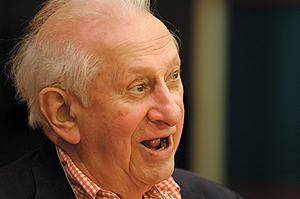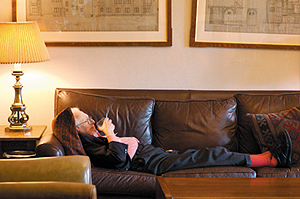Studs: A lifetime of listening
Raconteur Studs Terkel had an ear for other people’s stories.
By Carrie Golus, AB’91, AM’93
Photography by Dan Dry
Studs Terkel, PhB’32, JD’34, was in his first career a popular but not terribly famous radio host on Chicago radio station WMFT, known for his love of jazz and blues and his witty, wandering interviews. But it was his second career as author and oral historian—begun in 1967 at age 55—that built his national reputation. Ironically, Terkel became famous once he began to interview the unfamous people whom he described as the “et cetera” of history.

An unrepentant radical whose politics were forged as a young man in the Thirties, Terkel called his oral histories “guerrilla journalism.” “Only one other person used the tape recorder with as much fervor: Richard Nixon,” Katrina vanden Heuvel, editor-in-chief of the Nation, said at a December 7 tribute to Terkel held in New York. “If he had an -ism, his -ism was underdog-ism.”
In person, Terkel, who died on Halloween at age 96, cut a memorable figure. His wardrobe—described by Rick Kogan of the Chicago Tribune as “almost a costume”—remained the same for decades: a red-and-white checked shirt, red-knit tie, and red socks (the red to express his far-left sympathies); gray trousers, and a well-chewed cigar. Terkel, who never learned to drive, rode the bus to WFMT, where his official title was “free spirit”; sometimes he would photocopy articles he had found particularly interesting and pass them out to the other riders. Even while walking down the street alone, this professional talker could not stop talking. So, of necessity, he talked to himself.
Terkel—with his strong Chicago accent, a nickname borrowed from Studs Lonigan of James T. Farrell’s (X’29) trilogy of South Side novels, and numerous books that gave voice to Chicago’s citizenry—was in many ways synonymous with the city. But in fact Louis Terkel was born May 16, 1912, in the Bronx and did not move to Chicago until 1923. His childhood was so unhappy, he told biographer Tony Parker in an uncharacteristically revealing interview, that he had few memories of it, which might explain why New York figures so little into the Studs persona. In Chicago Terkel’s parents ran a series of boarding houses that catered to the working class. Terkel often said that the characters he met at the Wells-Grand Hotel on the Near North Side constituted his real education.
A double alumnus, but one who despised all forms of snobbery, Terkel had an ambivalent relationship with the University. “At times, when after a martini I feel too content with life as it is, I pick up a copy of the University of Chicago Magazine,” he wrote to the editor in 2004. “Its constant air of self-congratulation provides a never-failing antidote.” Terkel did occasionally accept invitations: he gave the commencement address at the Lab Schools in 2002 and was interviewed by Andrew Patner, X’81, during Alumni Weekend 2004.
But while he had earned a PhB, he rarely spoke about the College, preferring to tell stories about influential teachers at the public schools he attended. He did mention his degree from the Law School, where he enrolled because of his admiration for Scopes Trial lawyer and Hyde Parker Clarence Darrow; but unlike Darrow, he was an indifferent law student. “My three years at the U of C Law School (class of ’34) were the most bleak yet fascinating of my life,” Terkel once recalled. “It was not the fault of the good professors; they did the best they could with me. Mine was a hopeless case.”
According to Terkel, the most significant aspect of his Law School experience was the streetcar journey; transferring in Bronzeville, he often stopped to buy blues records—building a library for his eventual radio career. His one entirely fond association with Chicago was that it was also the alma mater of his wife, Ida, PhB’33, a social worker, who died in 1999.
Terkel flunked the bar exam on his first try and, though he passed the second time, never practiced law. He eventually found work in a writers’ project with the Works Progress Administration, writing and performing in plays. He went on to work in radio: because of his gruff voice, he often played thugs on dramatic programs. Later he became a disc jockey, hosting a show called The Wax Museum.

In trademark red-checked shirt and red socks, Terkel sips a Quad Club martini during Alumni Weekend 2004.
In 1950 Terkel had a brief flirtation with the new medium of television as the star and host of the show Studs’ Place. Set in a diner, with waiters and regulars as stock characters, it was like an early version of the sitcom Cheers. Studs’ Place was not political—except for the red-checked tablecloths that matched Terkel’s shirt fabric of choice—but in 1952, soon after NBC picked up the show for national broadcast, it was canceled. Terkel had been blacklisted for alleged un-American activities. (Years later, when Terkel and Ida requested their FBI files, he was jealous to discover that her file was thicker than his.)
So Terkel returned to radio, hosting a program that broadcast daily for 45 years, from 1952 to 1997. The hour-long show came on at 11 a.m. until it was moved to 5:30 p.m. in the late 1980s. Terkel rarely invited actors or politicians, but otherwise his guest list was wide-ranging: economist John Kenneth Galbraith, historian Garry Wills, composer Aaron Copland, neurologist Oliver Sacks. With an obsessive level of preparation but no written questions, Terkel’s interviews were as improvisational as the jazz he liked to play. Authors especially noted how carefully he had read and marked up their books—a habit of close reading that perhaps betrayed his unmentioned years in the College.
Terkel was nearing retirement age when publisher Andre Schiffrin, then at Pantheon, approached him with an unusual idea: a portrait of the city based on interviews with its citizens. Terkel hesitated but finally agreed. The result was Division Street: America (1967), a collection of interviews that not only received rave reviews but also became a best seller.
Many more volumes of oral history followed, as Schiffrin would propose an idea and Terkel would execute it: Hard Times: An Oral History of the Great Depression (1970), Working: People Talk About What They Do All Day and How They Feel About What They Do (1974), and “The Good War”: An Oral History of World War II (1984), which won the Pulitzer Prize for nonfiction. Terkel often said that the nation suffered from “national Alzheimer’s disease,” and his oral histories on labor, the Great Depression, and World War II were intended to serve as a remedy.
Most critics and readers enjoyed the rambling style of his interviews—“written ‘radio,’” in Kogan’s description—and did not mind that Terkel cut himself out of the conversation, rather than showing how he might have shaped it. Other critics disagreed. “When Division Street was published in 1967, its use of the verbatim technique, or ‘oral history,’ seemed a novel way to portray Richard Daley’s Chicago, and not a labor-saving gimmick,” Jacob Weisberg sniped in the New Republic in 1988. Terkel’s shapeless interviews, Weisberg added, constituted “what a better journalist might consider the raw material for a book.”
Terkel’s own life became raw material when he turned to autobiography, writing Talking to Myself: A Memoir of My Times (1977) and Touch and Go (2007). His final book, P.S. Further Thoughts from a Lifetime of Listening, came out in paperback in November. But while Terkel’s interviews were candid and illuminating, his memoirs were opaque and cagey. “There is nothing about Terkel’s father, next to nothing about his mother, a bare smidgen about his brother, a couple of stories about his wife,” reviewer Nora Ephron noted about Talking to Myself. Terkel claimed that he had met so many fascinating people, “it’s almost like there’s no room inside me to be interested in my own feelings and thoughts.”
Terkel was a much honored writer and historian. In typical Chicago fashion, on his 80th birthday the Division Street Bridge was named after him. Along with numerous honorary degrees, he received the National Book Award for lifetime achievement and the National Humanities Medal, bestowed on him by President Bill Clinton. As the story goes, Terkel was stopped at the White House gate and asked for ID—but as a lifelong nondriver, he had no driver’s license. Finally he was admitted on the basis of his Chicago Transit Authority senior’s pass.
Near the end of his life, Terkel, the great listener, had become virtually deaf. But he continued to write, publishing four books after age 90. He transferred 5,000 hours of his recordings to the Chicago History Museum, which has put much of the material online. Writer and activist Jamie Kalven noted the “delicious irony” that “this technological incompetent—he didn’t drive a car, could barely operate his tape recorder, never used a computer—is gloriously preserved on the Internet.”
Terkel’s uncanny ability to empathize with his interview subjects, whether they were jazz greats or garbagemen, household names or housewives, set him apart from other interviewers. “Studs just loved people,” said author Sydney Lewis, who worked with Terkel at WFMT and transcribed many of his interviews. “Deeply, profoundly, and with endless enthusiasm.”
“I have been in cabs with him and wondered at his ability to elicit the driver’s whole life story before we reached our destination,” recalled Garry Wills. “It was a gift that came from empathy, curiosity, and a willingness to let others express their views, even when Terkel did not share them.”
In a rare moment of personal candor, Terkel admitted to biographer Tony Parker that he could never say “I love you”: “Never,” he said. “I can’t get it out. I can feel it, sure, I think I can feel it—but I can’t say it. Don’t ask me why. People say it to me, Ida says it to me, but I can’t say it back.” And yet somehow he didn’t need to. People just knew.
WRITE THE EDITOR
DISCUSS THIS ARTICLE
EMAIL THIS ARTICLE
SHARE THIS ARTICLE
RELATED LINKS
- Studs Terkel
- Working: People Talk about What They Do All Day and How They Feel about What They Do
- P.S. Further Thoughts from a Lifetime of Listening
RELATED READING
- University of Chicago Magazine: Letters (February 2004)
- Chicago Tribune: Studs Terkel Dies (October 31, 2008)
- New York Times: Studs Terker, Listener to Americans, Dies at 96 (October 31, 2008)
WEB EXTRAS
Andrew Patner, X’81, interviewed Studs Terkel, PhB’32, JD’34, during Alumni Weekend 2004. Watch the entire conversation or listen to Terkel describe:
Blues music and the Law School (30 sec)
Hutchins and the Republic Steel Strike
(2 min)
Mahalia Jackson and CBS’s loyalty oath
(2 min)
